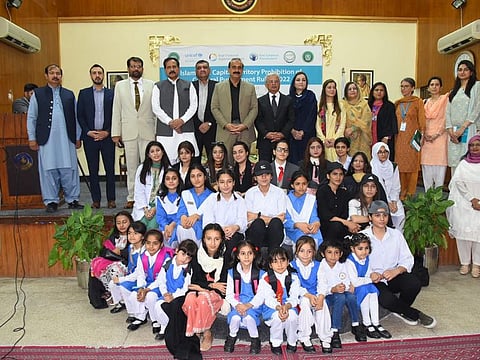Islamabad enforces ‘Prohibition of Corporal Punishment Act’
Physical punishment now banned in government, private schools in federal capital

ISLAMABAD: The federal government has introduced rules to enforce the “Prohibition of Corporal Punishment Act, 2021” in Islamabad’s Capital Territory (ICT).
The law was passed three years ago with an aim to put an end to corporal punishment both at the government and the private schools.
According to the members of civil society who have been calling for such a law banning physical punishment in the federal capital’s schools and elsewhere, the law now stands implemented in all the government and the private sector schools.
These rules will also serve to bring education standards on a par with the internationally-recognized schooling methods.
While announcing enforcement of the specific act at a ceremony in one of Islamabad’s schools, Minister for Education Rana Tanveer Hussain called for implementation of this law in letter and spirit at all the government and the privately-run schools of Islamabad.
He hoped that the provinces too would realize its significance and implement these rules at their schools as well. I am sure the rules would serve as the beginning of curtailing violence in schools and I will write to all provincial education ministries to take similar measures in their schools, he said.
Minister for Law and Justice, Azam Nazeer Tarar also congratulated the stakeholders in getting the corporal punishment rules enforced.
A late but correct step
“Implementation of these rules from today shall serve as the building block in achieving our greater vision aimed at the well-being of our children; the ultimate future of Pakistan.”
The government, he said, was committed to fully supporting the cause of child rights and related legislations in future as well.
Morals and values can’t be imparted through coercion or punishment, he remarked, adding, it was a late step but in the right direction.
The launch of the “Islamabad Capital Territory Prohibition of Corporal Punishment Rules, 2022” marks a historic milestone in the relentless pursuit of protecting children from the scourge of corporal punishment within the capital territory.
Singer-turned social activist, Shehzad Roy, CEO of Zindagi Trust, reaffirmed his commitment to launch a countrywide campaign in order to raise awareness on the matter and stressed the need to change the attitude of parents and teachers.
After speeches, heads of various education departments, heads of public and private schools, madrassas, and orphanages among others pledged to implement these rules in their institutions in letter and spirit.
According to the Unicef Representative Abdullah A Fadil, corporal punishment not only inflicts immediate pain and suffering, but at a later stage it may cause irrevocable damage to the children’s personality.
What does the law?
Under the ‘Prohibition of Corporal Punishment Act, 2021,’ teachers found involved in corporal punishment could face minor and major penalties, including compulsory retirement and dismissal from service.
The minor penalties include censoring, withholding for a specific period promotion or increment or financial advancement in accordance with the rules or orders pertaining to the service or post.
A bar on promotion and recovery from pay also falls in the category of minor penalties. Under major penalties, a teacher found guilty could face demotion to a lower post or time scale, compulsory retirement, removal and dismissal from service.
According to the law, “The child has the right to be shown respect for his personality and individuality and shall not be made subject to corporal punishment or any other humiliating or degrading treatment.”
Sign up for the Daily Briefing
Get the latest news and updates straight to your inbox



